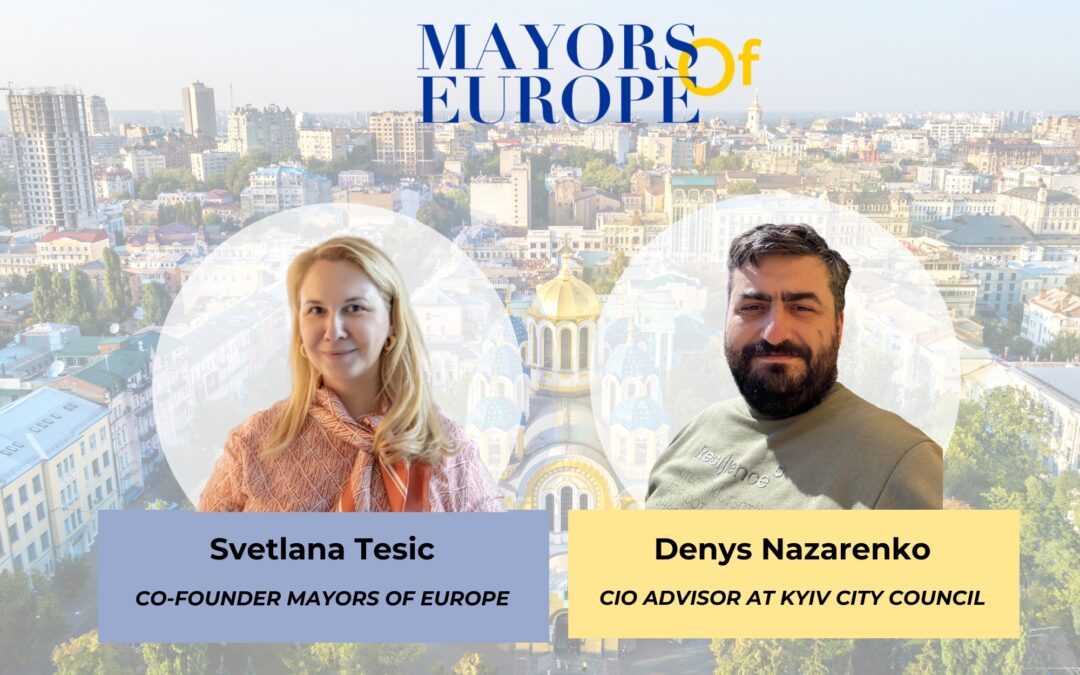Denys Nazarenko, Kyiv City Council: Dedication to creating urgency and momentum for impactful change while ensuring the human element remains central
As another difficult year for Ukraine is coming to its end we had the great honor of speaking to Mr Denys Nazarenko from City of Kyiv, Ukraine.
Denys Nazarenko serves as the CIO Advisor at Kyiv City Council, bringing extensive experience in operational transformation and change management to elevate public services to their ultimate form. He combines a pragmatic approach to governance with a deep understanding of the complexities of urban systems. At the core of his work is a dedication to creating urgency and momentum for impactful change while ensuring the human element remains central. Denys is driven by the belief that effective public services not only solve immediate challenges but also build trust and resilience within communities. With a strong focus on facilitating international collaboration in the smart city domain, Denys’s priority areas of interest include public safety, data governance, AI, and energy resilience. Leveraging insights from the best global practices, he is open to sharing his own knowledge and contributing to meaningful conversations about the future of governance and urban transformation.
In his own words: “My brain is wired to serve the community.”
- Dear Denys, 2024. was another difficult year for Ukraine and its citizens with so much resilience demonstrated in everyday life. From a professional perspective, how was your year? What are some highlights you will remember as small or big wins or failures?
2024. has been a year of profound reflection and forward-looking action. A major highlight was initiating dialogues to scale the resilience tech experience and governance frameworks across Ukraine and internationally. This was not just about sharing knowledge but about co-creating solutions for communities facing unparalleled challenges.
Another key moment was recognizing the potential of advanced technologies, originally developed for specialized applications, to address challenges in public safety within the smart city domain. Additionally, shifting the vision for what lies beyond the “smart city” concept was transformative. By focusing on “connected communities” and the idea of a “sensible city,” we began to ask what truly comes next for urban innovation.
Finally, amidst growing financial challenges globally, I am heartened by the increasing recognition that while creating value remains paramount, delivering this value at a reasonable cost is an equally crucial dialogue.
- You participated in many flagship conferences this year, from Bloomberg City Lab annual conference to Barcelona Smart City Expo. In your opinion, what positive changes in our cities we can optimistically expect in the year to come? What were some solutions or policies that gave you great hope for the future of our cities?
The growing emphasis on collaboration ecosystems stands out as a beacon of hope. Inter-city collaboration (ICC) enables cities to exchange insights and collectively address shared challenges, such as sustainability, resilience, and digital transformation.
Generative AI (GAI) presents significant opportunities, yet its potential biases highlight the critical need for ethical governance frameworks. For these tools to serve communities effectively, inclusivity and fairness must be prioritised from the outset. Additionally, proactive efforts to combat disinformation have emerged as essential for maintaining trust in governance and safeguarding public safety.
Equally important is the need for cities to establish a single, reliable, and consistent communication channel. This approach ensures accurate dissemination of information, enhances the credibility of public messaging, and promotes effective community coordination during critical times.
- Kyiv Digital is a progressive and citizen-oriented digital platform that not only offers e-government services but also for example mental well-being help which makes it more than just an administration app. Tell us about Kyiv Digital’s strategy, and what are some of the innovative services you are planning to implement in time to come?
Kyiv Digital continues to evolve as a comprehensive ecosystem, integrating diverse services, platforms, and innovations to meet the dynamic needs of its citizens. Within this framework, mental health initiatives are becoming a vital component, supported by research from Bloomberg Philanthropies. The focus remains on expanding these services with insights that bridge local realities and global expertise.
One of our most ambitious steps forward is the launch of Digital Impact Global (DIG), a pioneering organization based in Kyiv. DIG builds upon the foundational concepts pioneered by the London Office of Technology and Innovation (LOTI) and Milan’s Innovation Technology and Digital Transformation Board. By promoting global collaboration and shared ownership, DIG is committed to driving meaningful change. These partnerships empower communities to actively participate in their city’s transformation, ensuring the effective use of technology to meet real-world needs.
- Speaking about the Kyiv Digital app, what role does public feedback play in shaping your policies during a period of digital transformation? What are some key challenges you faced so far? Different or insufficient levels of digital literacy or digital generation gap, for instance, and how are you dealing with them?
Public feedback is a cornerstone of Kyiv Digital’s mission to empower citizens to ‘own your city.’ This continuous exchange of ideas ensures that digital transformation initiatives are aligned with the evolving priorities of the community. Feedback mechanisms, such as surveys, petitions, and insights gathered during acceleration programmes, provide actionable data to guide decision-making. Participatory budgeting, paused due to the war, remains a vital component of our strategy and will play a critical role in post-war recovery.
By embedding citizen engagement at every stage, we create services that are not only responsive but also reflective of the community’s diverse needs.
One of the primary challenges has been ensuring equitable access to technology. Addressing this requires strategic collaboration with public and private stakeholders to expand digital connectivity and improve access to devices for underserved populations. These efforts are designed not only to bridge immediate gaps but also to build a scalable and resilient digital ecosystem that adapts to the evolving needs of our communities.
Gender Equality and Social Inclusion (GESI) principles are systematically embedded within our digital services playbook. This ensures that all design updates adhere to globally recognized accessibility standards, with particular attention to supporting visually impaired users and other underserved groups. By embedding these principles into the framework, we create solutions that are not only inclusive but also aligned with the broader goal of equitable digital transformation.
- What book you would gladly recommend to leaders of the cities? What’s on your reading list for 2025.?
For city leaders navigating complex challenges, I recommend these thought-provoking books:
- Platformland: An Anatomy of Next-Generation Public Services by Richard Pope – A deep dive into the evolution of public services and their intersection with digital transformation. https://a.co/d/1px9HPE
- Extreme Ownership: How U.S. Navy SEALs Lead and Win by Jocko Willink and Leif Babin – A powerful perspective on leadership under pressure. https://a.co/d/1LqZm68
- Bridgebuilders: How Government Can Transcend Boundaries to Solve Big Problems by William D. Eggers and Donald F. Kettl – An essential read for collaborative governance.https://a.co/d/8zplxY9
I am grateful for this opportunity to share thoughts and ideas. We extend our heartfelt thanks to everyone supporting efforts to empower local governments.













